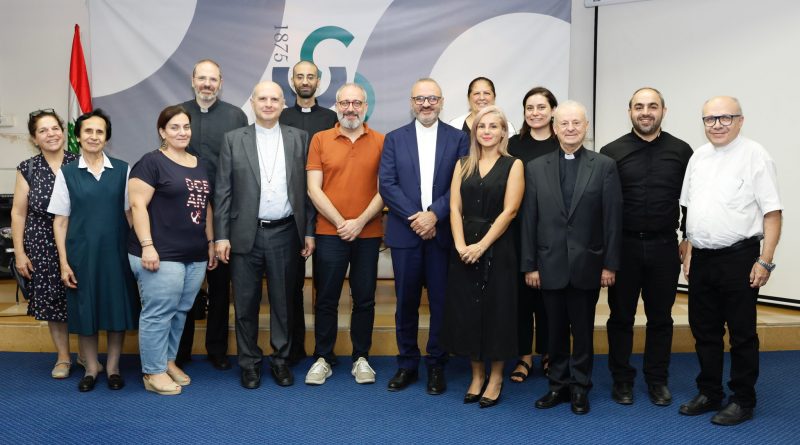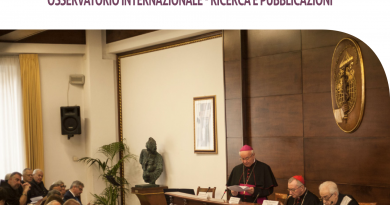Il prof Vincenzo Rosito come Visiting Professor all’Università La Sagesse e al Centro Jp2 a Beirut
Visiting Professor Vincenzo Rosito dell’Istituto Pontificio Giovanni Paolo II di Roma all’Université La Sagesse
23 settembre – 17:00
“La missione dell’università non si limita all’insegnamento e alla ricerca, ma è anche un laboratorio culturale sicuro per la comunicazione”
L’Université La Sagesse ha ospitato il professore Vincenzo Rosito dell’Istituto Pontificio Giovanni Paolo II per le Scienze del Matrimonio e della Famiglia di Roma, nell’ambito dell’accordo di cooperazione firmato tra l’università e l’istituto per organizzare conferenze, workshop, sessioni di formazione e lo scambio di conoscenze e competenze.
Nel corso di tre giorni, il professor Rosito ha tenuto lezioni specialistiche organizzate dal direttore dell’Istituto per la Famiglia dell’Università La Sagesse, padre Youssef Abi Zeid, alla presenza del vescovo Antoine Aoukar, del decano della Facoltà di Scienze religiose e teologiche, padre Tanios Khalil, e dei membri del Consiglio universitario: il Vicepresidente per gli Affari Accademici Dr. Rayan Haykal, il Vicepresidente per la Ricerca e lo Sviluppo Dr. Etienne Harb, il Vicepresidente per le Relazioni Internazionali e Istituzionali Dr. Lily Assaf, insieme a un gran numero di professori della Facoltà di Scienze Politiche e Relazioni Internazionali e della Facoltà di Scienze Religiose e Teologiche.
Le lezioni si sono concentrate sulle esperienze educative e sulle linee guida pedagogiche sviluppate dall’Istituto di Roma negli ultimi anni, partendo dall’impegno di mettere le comunità accademiche al servizio della Chiesa sinodale da un lato, e di integrare i valori e le pratiche sinodali nella gestione della vita accademica dall’altro. Sono stati inoltre affrontati i modi per preparare gli studenti in modo significativo ai ruoli importanti che svolgeranno nella Chiesa sinodale.
Il professor Vincenzo Rosito ha sottolineato che ci sono tre missioni essenziali che definiscono il ruolo di un’università: insegnare, ricercare, comunicare i risultati della ricerca. Ha aggiunto che la comunicazione è un elemento centrale di queste missioni, poiché trasmette le “verità della realtà” e le “parole di vita” e, indubbiamente, la vita accademica risente negativamente quando l’equilibrio tra insegnamento, ricerca e comunicazione viene compromesso.
Rosito ha proseguito sottolineando che l’impegno nella ricerca, sia individuale che collettiva, è necessario per evitare di ripetere le stesse lezioni impartite agli studenti nel corso degli anni. Inoltre, le domande sollevate dagli studenti forniscono materiale prezioso per la ricerca e per preparare risposte scientifiche complete. Pertanto, la circolarità tra insegnamento e ricerca è fondamentale. Tuttavia, rimane insufficiente senza aggiungere la terza missione, che è la comunicazione.
Ha sottolineato che attraverso la comunicazione l’università dimostra il suo impegno a costruire “il mondo che condividiamo”. Ciò può essere realizzato aprendo la propria attività a iniziative con enti e istituzioni non accademiche (associazioni, gruppi professionali, movimenti pastorali, ecc.). In questo modo, le comunità accademiche non si limitano solo all’insegnamento, ma si impegnano anche nell’apprendimento attraverso una comunicazione migliorata, che a sua volta porta a migliorare sia l’insegnamento che la ricerca. Rosito ha aggiunto che questa terza missione riflette anche l’impegno dei professori a rinnovare i metodi di insegnamento e ad adottare nuovi metodi di ricerca.
Il professore ospite Vincenzo Rosito ha anche citato una dichiarazione di Papa Francesco che invita a uno sforzo congiunto per rendere le università “una sorta di laboratorio culturale provvidenziale in cui la Chiesa compie l’interpretazione performativa della realtà determinata dall’evento cristologico”.
Il significato di “laboratorio culturale” nella vita accademica
Le lezioni sono state seguite da workshop in cui i partecipanti hanno affrontato il significato di “laboratorio culturale” e i “modi per interpretare efficacemente la realtà nella vita accademica”. Le discussioni hanno sottolineato che l’università è un laboratorio sicuro, che apre la strada all’apprendimento attraverso esperienze, errori, revisioni e correzioni. Non è solo un luogo di verità scientifiche, ma anche uno spazio che trasforma le comunità nella loro ricerca delle “verità scientifiche”. È anche quel laboratorio che scopre modi di dialogo tra le culture e all’interno di ciascuna cultura.
Fonte: National News Agency in arabo
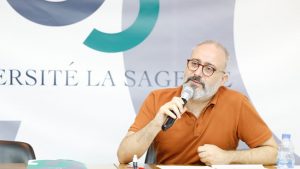
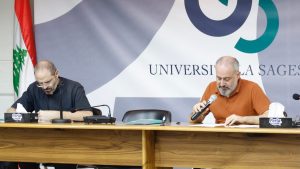
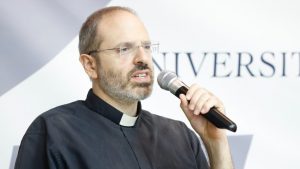
Visiting Professor Vincenzo Rosito from the Pontifical John Paul II Institute in Rome at Université La Sagesse
September 23 – 17:00

“The university’s mission is not limited to teaching and research, but it is also a safe cultural laboratory for communication”Université La Sagesse hosted visiting Professor Vincenzo Rosito from the Pontifical John Paul II Theological Institute for Marriage and Family Sciences in Rome, as part of the cooperation agreement signed between the university and the institute to organize conferences, workshops, training sessions, and the exchange of knowledge and expertise.
Over the course of three days, Professor Rosito delivered specialized lectures organized by the Director of the Family Institute at Université la Sagesse, Father Youssef Abi Zeid, in the presence of Bishop Antoine Aoukar, the Dean of the Faculty of Religious and Theological Sciences, Father Tanios Khalil, and members of the University Council: Vice President for Academic Affairs Dr. Rayan Haykal, Vice President for Research and Development Dr. Etienne Harb, Vice President for International and Institutional Relations Dr. Lily Assaf, along with a large number of professors from the Faculty of Political Sciences and International Relations and the Faculty of Religious and Theological Sciences.
The lectures focused on the educational experiences and pedagogical guidelines developed at the Institute in Rome in recent years, starting from the effort to put academic communities at the service of the synodal church on the one hand, and to integrate synodal values and practices into the management of academic life on the other. They also addressed ways to prepare students in a meaningful way for the important roles they will play in the synodal Church.
Professor Vincenzo Rosito emphasized that there are three essential missions that shape the role of a university: teaching; researching; communicating the results of research. He added that communication is a core element of these missions, as it conveys the “truths of reality” and the “words of life,” and undoubtedly, academic life is negatively affected when the balance between teaching, research, and communication is disrupted.
Rosito continued by noting that commitment to research—whether individual or collective—is necessary to avoid repeating the same lessons given to students over the years. Moreover, the questions raised by students provide valuable material for research and for preparing comprehensive scientific responses. Therefore, the circularity between teaching and research is fundamental. However, it remains insufficient without adding the third mission, which is communication.
He stressed that through communication, the university demonstrates its commitment to building “the world we share.” This can be achieved by opening up to initiatives with non-academic entities and institutions (associations, professional groups, pastoral movements, and so on). Thus, academic communities do not confine themselves to “teaching” only, but also engage in “learning” through enhanced communication, which in turn leads to improve both teaching and research. Rosito added that this third mission also reflects the professors’ commitment to renewing teaching methods and adopting new research methods.
The visiting professor Vincenzo Rosito also cited a statement by Pope Francis calling for joint efforts to make universities “a sort of providential cultural laboratory in which the Church carries out the performative interpretation of the reality brought about the Christ event.”
The meaning of a “cultural laboratory” in academic life
The lectures were followed by workshops in which participants addressed the meaning of a “cultural laboratory” as well as “ways of effectively interpreting reality in academic life.” The discussions emphasized that the university is such a safe laboratory, one that opens the way for learning through experiences, mistakes, revisions, and corrections. It is not merely a place for scientific truths, but also a space that transforms communities as they search for “scientific truths”. It is also that laboratory which discovers ways of dialogue between cultures and within each culture.

